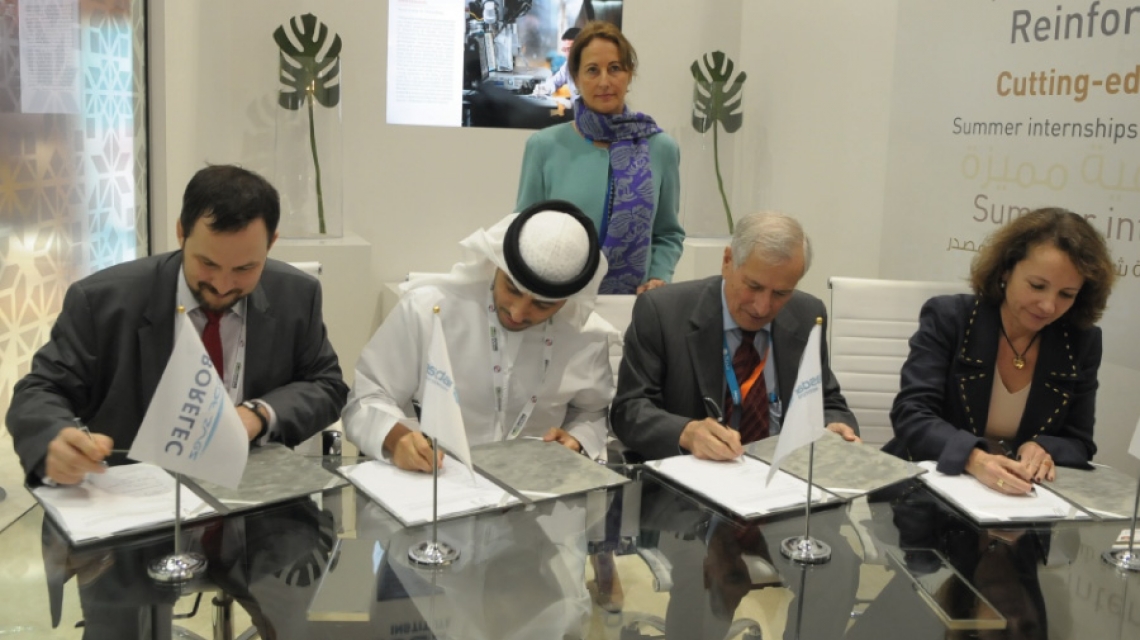
Abu Dhabi-UAE: 19 January, 2015 – The Masdar Institute of Science and Technology, an independent, research-driven graduate-level university focused on advanced energy and sustainable technologies, today announced its research collaboration with three leading advanced energy and clean technology corporations to execute a research project supporting the development of a completely solar-powered, full-scale seawater reverse osmosis (SWRO) desalination plant in the UAE.
The UAE relies on desalination plants for most of its potable water. These plants are powered by natural gas, which contributes almost a third of the UAE’s greenhouse gas emissions. Turning to a more sustainable method of clean water production can save costs in the long run and reduce carbon emissions.
Collaborators include Masdar – Abu Dhabi Future Energy Company, which works to develop and invest in renewable and clean energy in Abu Dhabi; Laborelec – a subsidiary of GDF Suez, an international research center and technical service provider that specializes in electrical power technology and sustainable energy; and Degrémont – a subsidiary of Suez Environment, a water treatment and services provider dedicated to finding sustainable water management solutions.
Dr. Ahmad Belhoul, CEO, Masdar Corporate, Dr. Fred Moavenzadeh, President, Masdar Institute, Mr. Pierre Pauliac, Director Middle East, Degrémont, and Mr. Michael Marique, Managing Director, Laborelec, signed the agreement in the presence of Ségolène Royal, French Minister of Ecology, Sustainable Development and Energy, during the 8th annual World Future Energy Summit (WFES), which is taking place from 19-22 January, 2015 in Abu Dhabi.
Dr. Moavenzadeh said: “Through this agreement between Masdar, Masdar Institute, Laborelec and Degrémont, we hope to leverage our renewable energy experience and expertise to produce a cutting-edge SWRO plant powered exclusively by renewable energy. This research will help bring the UAE closer to its goal of producing a greater proportion of its electricity from renewable energy and will contribute significantly to the UAE’s research and development expertise.”
All four collaborators have been deeply involved in renewable energy and/or SWRO research. Now, through their concerted efforts, they will be harnessing the synergy needed to find the most efficient and economical solutions for a solar energy-powered SWRO plant for the UAE.
The research collaboration will focus on selecting the most practical and economical photovoltaic (PV) and solar thermal energy technologies to supply a full-scale SWRO with locally produced renewable energy. The parties will jointly work to develop an optimized design of a solar energy powered SWRO desalination plant. They will then attempt to demonstrate, according to the particular conditions of a selected UAE site, the ability to produce the required quality and quantity of fresh water on a large scale.
Masdar’s Renewable Energy Desalination Program was initiated to discover advanced and innovative desalination technologies that can be powered by renewable energy. Masdar has operated several solar irradiance measurement stations across the UAE from 2009 through June 2013 and continues to operate one high-precision station in Al Aradh, close to Al Ain. Masdar and Masdar Institute has expertise in solar resource assessment – a method of determining precise measurement of the sun’s radiation in order to optimize PV systems – and cost modeling of renewable power plants.
At Masdar Institute, Dr. Hassan Arafat, leader of the Membrane and Sustainable Desalination Research Group (MSDR) and Associate Professor, Department of Chemical and Environmental Engineering, will act as the project’s principal investigator. Dr. Arafat has developed tools in the field of technical and environmental assessment and cost modeling of renewable energy-powered desalination technologies. Additionally, Masdar Institute has been developing innovative concentrated solar power (CSP) technologies – used to capture, store, and transport solar thermal energy – and has contributed to the development of solar radiation concentrating systems in order to optimize PV systems.
Laborelec’s Renewable Energy Research Program covers selected topics in solar energy, wind turbine efficiency, ocean power and biofuels. One of Laborelec’s notable contributions to the solar energy sector is the creation of a thin-film photovoltaic panel test pilot.
Degrémont has already created 250 SWRO desalination plants and has achieved a laudable track record for incorporating the use of renewable energies for a plant’s power supply, fostering internal energy recovery, and implementing procedures to disperse saline concentrates to protect marine flora and fauna.
WFES is held under the patronage of His Highness Sheikh Mohammed Bin Zayed Al Nahyan, Crown Prince of Abu Dhabi and Deputy Supreme Commander of the UAE Armed Forces and is the anchor event of Abu Dhabi Sustainability Week (ADSW), which includes the third International Water Summit (IWS), EcoWASTE, and the Zayed Future Energy Prize. Hosted by Masdar, Abu Dhabi’s renewable energy company, this eighth iteration of the conference is expected to attract upwards of 30,000 delegates from 170 different countries, representing expertise from industry, technology, finance and government.